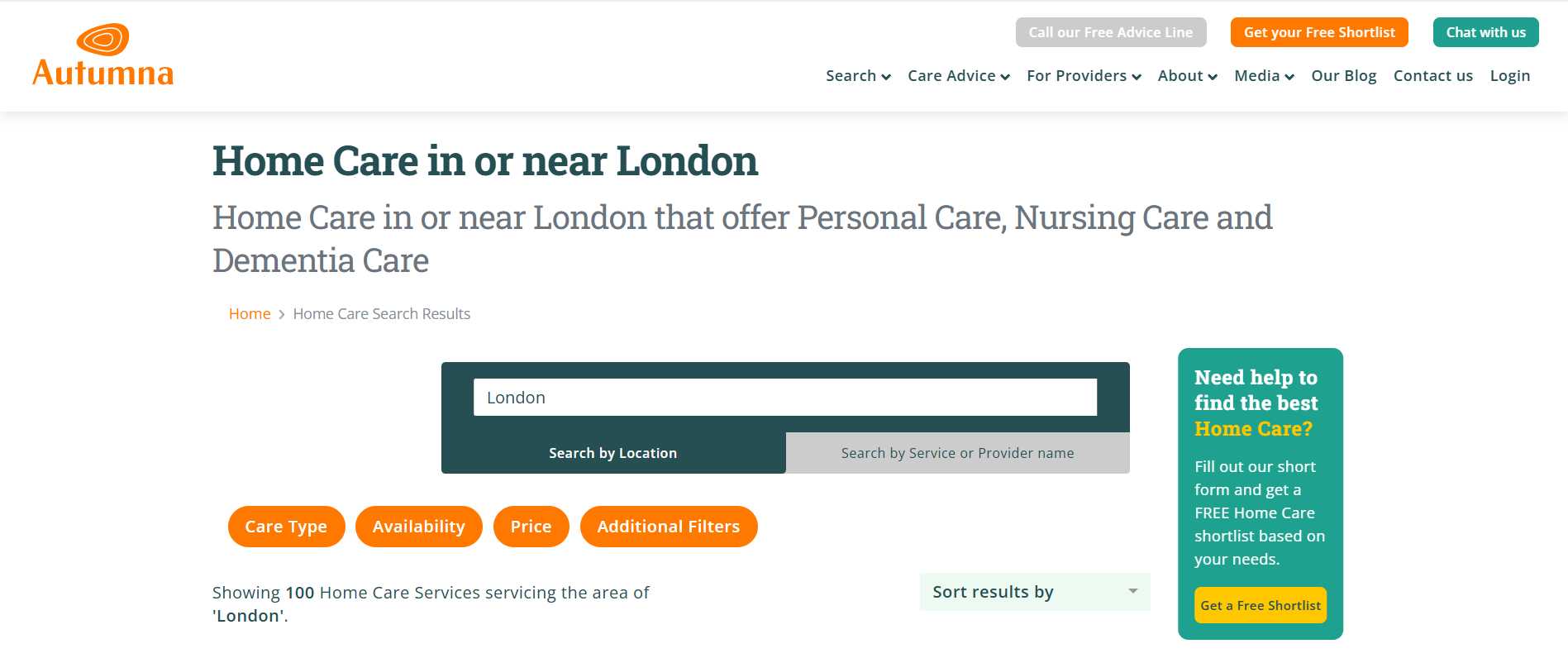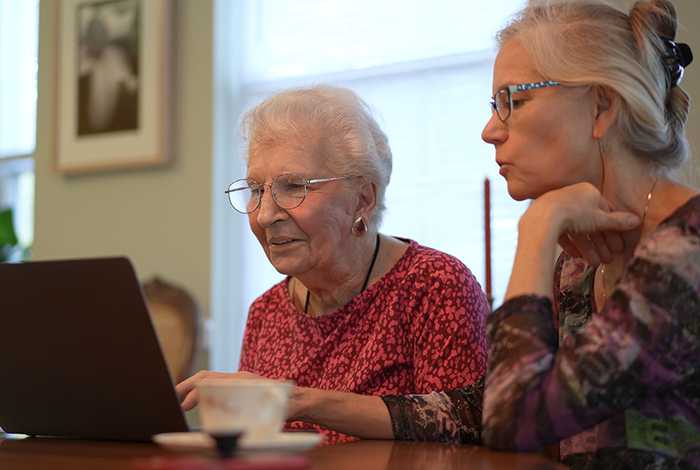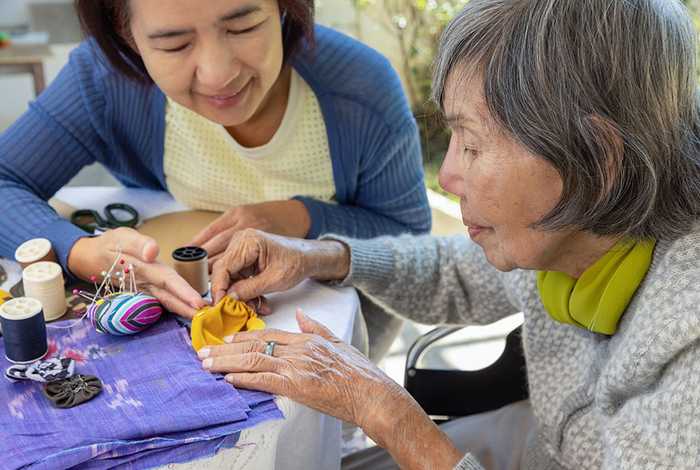Posted by Janine Griffiths
Ultimate guide to care at home for elderly people

There's something irreplaceable about waking up in your own bed, knowing exactly where everything is, and moving through rooms filled with a lifetime of memories.
Care at home for elderly people offers a way to receive the support you or your loved one needs while staying exactly in your own home, creating a practical alternative to moving into a care home.
This approach isn't just about avoiding institutional care. It's about building a support system that fits around your life, your routines, and your personal choices. Whether you need help with daily tasks or you are looking for home care on behalf of a loved one, home-based care can be tailored to match your specific requirements, whether that be personal care, cooking, or house chores.
For most of us, home represents far more than just a place to live. It's where we feel most ourselves. The good news is that getting older doesn't have to mean giving up the comfort of being in your own home.
We'll walk you through the real benefits of choosing care at home, explore the different types of support available, cover the important considerations, and help you understand how to find the right care team for your situation.
The different types of care at home for elderly people
When it comes to home care, one size definitely doesn't fit all. The beauty of care at home lies in its flexibility to match your specific needs and circumstances. One of the first decisions you'll face is choosing between live-in care and hourly visiting care.
Live-in care vs hourly care
Live-in care means a professional carer moves directly into your home to provide round-the-clock care, companionship and support, which is ideal if you need regular assistance throughout the day and night or simply feel safer with continuous support nearby. The benefits of live-in care is that the carer is there whenever you need them the most. However, it does mean sharing your home with another person.
Hourly care involves carers coming to your home at scheduled times to help out with tasks that are too difficult for you to manage on your own. This could range from helping with household chores, to assisting with aspects of your personal care such as showering. This is perfect for those who value their independence but need help with specific tasks like medication reminders or personal care. However, hourly carers often see multiple people per day, so they may be on a tight schedule or may not always be there when you need them.
Companionship care
The type of support you receive can vary significantly too. Companionship care focuses on the social side of wellbeing. A companion can share a cup of tea and conversation, accompany you on walks or shopping trips, help with light housework, or simply provide friendly company during the day. This type of care is particularly valuable if you're feeling isolated or just want someone reliable to spend time with regularly.
Personal care
Personal care steps in when you need hands-on assistance with daily activities. This might include help with washing, dressing, getting in and out of bed, preparing meals, or help with taking medication. Personal care workers are trained to provide this support with dignity and respect for your privacy.
Specialist home care
Specialist care addresses more complex health conditions. Whether you're living with dementia, recovering from surgery, or managing a long-term illness which requires private nursing care at home, specialist carers bring specific training and experience to support your particular needs safely and effectively.
Key benefits of care at home
For many, choosing care at home is not just a practical decision, it is a way to preserve independence and dignity in everyday life:
Independence
One of the strongest advantages of care at home is the ability to maintain independence. You can continue to follow your daily routines, make your own choices, and feel in control of your day. Support is designed around your life, not the other way around, so help arrives when it is needed most and can adjust as your needs change.
Wellbeing
Care at home also nurtures wellbeing. Being in familiar surroundings with professional support nearby helps build confidence, ease anxiety, and keep life as comfortable as possible. Knowing that someone is there to assist when necessary gives both you and your family peace of mind. Loved ones can rest assured that support is available without the need to move or disrupt daily life, making it easier to enjoy time together.
With care at home, the focus is on living fully and safely in your own space, with the reassurance of professional support whenever it is needed.
Companionship
Being at home can sometimes feel isolating, especially if family and friends cannot be around as much as they would like. Care at home for elderly people offers more than practical help, it provides a steady presence, someone to share conversation with, a laugh, or even quiet moments of company. This companionship can make a real difference to daily life, turning routines into opportunities for connection rather than reminders of loneliness.
Peace of mind
Having care at home brings a deep sense of reassurance and calm. Knowing that professional support is there when you need it allows you to feel safe in your own space. Everyday tasks and challenges can feel less stressful because help is available, giving you the confidence to go about your life without constant worry.
This peace of mind also comes from the predictability and reliability of care. You can trust that someone will be there to assist when needed, whether it’s for personal care, medication, or simply having a friendly presence nearby. This stability makes it easier to maintain routines, enjoy daily activities, and feel in control of your own life.
You can find more insights in our blog, ‘What are the benefits of home care?’
Assessing the need for elderly care at home
It is not always easy to know when extra support is needed, but recognising the signs early can ensure that you get the help you need before things become too challenging.
Difficulty managing daily tasks
One sign is difficulty managing everyday tasks. Simple routines like cooking, cleaning, or remembering medication may become harder, and this can affect both independence and wellbeing.
Loneliness and isolation
Loneliness and isolation can take its toll on your mental wellbeing. This can happen after the loss of a loved one, or even just because of reduced engagement with family and friends, which can lead to depression or anxiety.
Whatever the reason, having less regular contact with others can lead to feelings of sadness or disconnection. Care at home offers not just support, but companionship too. Seeing a friendly face and having a cup of tea and chat with someone can go a long way towards alleviating feelings of isolation.
Cognitive decline
Cognitive decline may include things such as memory loss, forgetting medications, appointments, people’s faces, and difficulty in managing finances or day-to-day responsibilities. There may be a range of different causes for this, including dementia, mental health challenges or the natural effects of ageing.
Regardless of the cause, tailored care at home for elderly people makes a real difference and carers can help with memory prompts, structured routines, scheduling and more.
Increased falls/accidents
Finally, safety concerns such as an increased risk of falls or difficulty moving around the home can highlight the need for professional help. Knowing that someone is there to provide support brings peace of mind and reduces the risk of injuries or falls.
Caregiver strain
Caring for a loved one can take a heavy physical and emotional toll on family members.
Signs of caregiver strain include neglecting personal health, persistent tiredness, increased irritability, reduced interest in usual activities, sleep difficulties, and challenges with concentration or managing daily responsibilities.
Noticing the signs of strain is an indication that it may be time to seek extra support, helping both the caregiver and the person receiving care stay well
How to plan ahead for home care
Taking time to think through your options now can save stress later and ensure that the care provided truly meets your needs. Here are some key things to consider:
Staff training and certifications
It is important to know that the carers supporting you are qualified and properly trained. Ask about the agency’s training standards, whether staff are experienced in areas such as medication management, dementia care, or mobility support, and how their skills are kept up to date. This helps give reassurance that you are in capable hands.
Services that match your needs
Not every care agency offers the same level of support. Some may focus more on personal care, while others provide help with household tasks or companionship. Think carefully about the type of support you need now, and whether the provider can adapt as your needs change over time. Choosing an agency that offers a wide range of services can give you flexibility for the future.
Communication and reporting
Clear communication is essential. Find out how the agency keeps you and your family informed - whether through regular updates, care notes, or a dedicated point of contact. Knowing who to speak to if you have questions or concerns can make the whole experience feel more supportive and less overwhelming.
How is home care funded in the UK
Below are several ways to cover the costs of home care, depending on your health and financial situation.
- Help from your local council: If your savings and income are limited, your council may be able to pay towards your care. They will look at what support you need and how much money you have before deciding what they can offer. In England and Northern Ireland, people with savings below £23,250 may qualify, though the rules differ in Scotland, and Wales.
- NHS funding: If you have serious health needs, the NHS may cover the full cost of your care. This is called NHS Continuing Healthcare.
- Attendance Allowance: This benefit is for people aged 65 and over who need help with personal care because of illness or disability. It is not means-tested, which means your income and savings do not affect whether you can claim.
- Personal Independence Payment (PIP): This is for people under 65 who have a long-term illness or disability that affects daily living or mobility. Like Attendance Allowance, it is not based on income or savings. The PIP you receive depends on how your condition affects your ability to manage everyday activities and get around.
- Paying privately: Many people choose to pay for home care themselves, either fully or to add extra support to what the council provides. This can come from savings, pensions, or sometimes through releasing money from property.
How to find quality care at home for elderly people
If you are looking for quality home care, Autumna can help. Simply head over to the search bar above our website and select either home care or live in care. Next, type in your location and you can view a list of search results.
You can also use the orange filter tabs at the top of the search results to find home care or live-in care services that are more closely aligned to your requirements.

Alternatively, our Care Finding tool can do all the heavy lifting for you. By answering a few quick questions, you can get matched with a list of home care services that are even more personalised to your circumstances.
If you need to talk through your options, our friendly and supportive team of advisors are available 7 days a week to answer any questions you may have. You can contact them on 01892 335 330.
Receive a Free Home Care Shortlist!
Let our expert team of advisers get your search off to a great start.
Tell us a little about your needs and we'll send you a bespoke shortlist of home care providers! Click the button below to begin, it takes just a few minutes.
Other articles to read
From the blog

Older Persons Care Advice
Ultimate guide to jointly owned property and care home fees
September 26th, 2025
Understand jointly owned property and care home fees, how assessments work, and steps to protect your finances and plan ahead with confidence.

Older Persons Care Advice
What are the pros and cons of care homes?
September 26th, 2025
Weigh the pros and cons of care homes to make the right choice for you or a loved one. Discover benefits, challenges, and tips for finding the best fit.

Older Persons Care Advice
Person centred care and dementia: A guide for families
September 23rd, 2025
Discover how person centred care and dementia support go hand in hand. Learn practical tips, expert insight, and guidance for families seeking the best care.
Frequently Asked Questions
Care at home for elderly people means receiving tailored support, from daily tasks to specialist care, while remaining safe and independent at home.
Funding can come from local councils, NHS Continuing Healthcare, benefits like Attendance Allowance, or private payment through savings or pensions.
Live-in care provides 24/7 support with a carer living in your home, while hourly care offers scheduled visits for specific daily tasks and personal assistance.
Look for trained staff, services that match your needs, clear communication, and the ability to adapt support as circumstances change.






